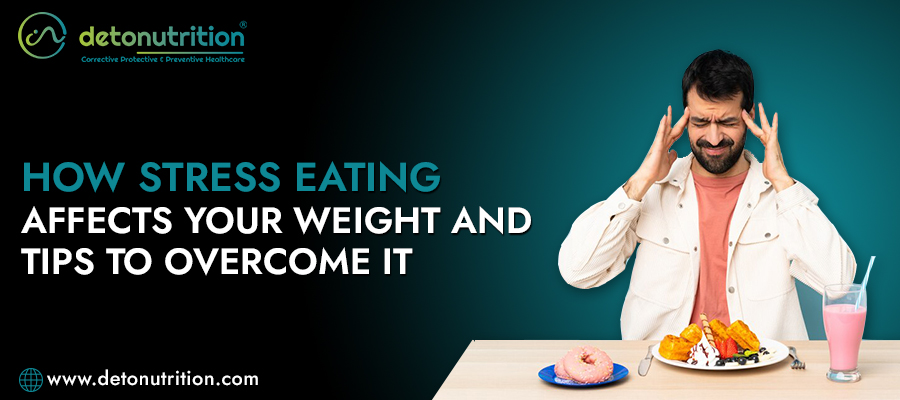How Stress Eating Affects Your Weight And Tips To Overcome It
Stress eating which is also known as emotional eating is a common coping mechanism where individuals turn to eating food in order to manage stress, anxiety, or other negative emotions. While it may provide temporary relief, it can have significant negative consequences for your weight and overall health. So, if you ever felt like eating a bag of chips or a chocolate bar between your work hours because of stress, it’s an urge to eat emotionally. And if it happens frequently or becomes your main way to deal with your emotions, then your life, health, happiness, and weight are negatively affected. However, if you want to overcome this, we can help you! Read on this blog, to know how stress eating increases your weight and how to overcome it for a healthier and happier life.
How Stress Eating Affects Your Weight?
When you're stressed, your body releases cortisol which is a kind of stress hormone that increases your appetite and cravings for high-calorie, high-fat, and sometimes sugary foods. This can lead to overeating and weight gain over time. Additionally, stress can disrupt your sleep patterns, further contributing to weight gain and making it harder to maintain your healthy weight.
Tips to Overcome Stress Eating
Here are some practical tips that can definitely help you to break the cycle of stress eating and manage your weight:
1. Identify Your Triggers
Keep a diary or journal to track your eating habits and identify the situations that trigger your emotional eating. The common triggers include loneliness, anger boredom, stress, or frustration. Once you identify your triggers, you can develop strategies to manage them effectively.
2. Practice Mindful Eating
Pay attention and know the difference between your body's hunger and fullness cues to practice mindful eating. Eat slowly and savor each bite for better fulfillment. Avoid distractions like watching television or phone while eating. Focus on the taste, texture, and smell of your food.
3. Find Healthy Alternatives
When you feel the urge to stress eat, find healthy food alternatives. Consider low-calorie and less fat food options instead of unhealthy processed ones. For example, if you want to eat something sweet. Take an apple and a nut butter of any kind then, cut the apple and spread your favorite nut butter and it’s ready to eat. This healthy combination of fats, carbs and protein helps satisfy your sweet tooth.
4. Develop Healthy Eating Habits
Eat regular meals and snacks to avoid feeling overly hungry. Choose nutrient-dense foods that will keep you satisfied for longer. Limit your intake of processed foods, sugary drinks, and excessive caffeine. Stay hydrated by drinking plenty of water throughout the day. Additionally, watch your portion size to prevent overeating.
5. Take Herbal Stress Relief Supplement
Taking a stress-relieving supplement also helps in overcoming your emotional eating. It helps in reducing stress, and anxiety which helps in relaxing the mind and body. It also induces sound sleep which decreases the urge of stress eating.
6. Social Support
If you lack social support then try to lean on your family, friends or join a fitness community for social support. Joining a fitness community will help you feel less bored and sad and give you an interest in engaging in physical activity, such as going for a run or brisk walk or doing yoga. Spend time with loved ones or engage in hobbies you enjoy outdoors. If you don’t want to do any outdoor physical activity then practice relaxation techniques like deep breathing or meditation at home.
7. Seek Professional Help
If you find it difficult to manage stress eating on your own, consider seeking professional help from a therapist or registered dietitian. They can provide you with personalized guidance and support.
Conclusion:
Remember, overcoming stress eating takes time and effort. Be patient with yourself and celebrate your progress. By implementing these strategies, you can break free from the cycle of stress eating and achieve a healthier relationship with food and your body.

We have a vision to take good care of your health and nutrition with products which are made from research and experience. Our team is technical as well as experienced so that we can deliver you the best products for your health and wellness.
Stay Fit, Stay Healthy And Stay Happy Always!
QUICK LINKS
CATEGORIES
Subscribe Us
Subscribe to Dr. Aaditya's Health Blog Email Newsletter
© Copyright - Detonutrition. All Right Reserved 2026.




